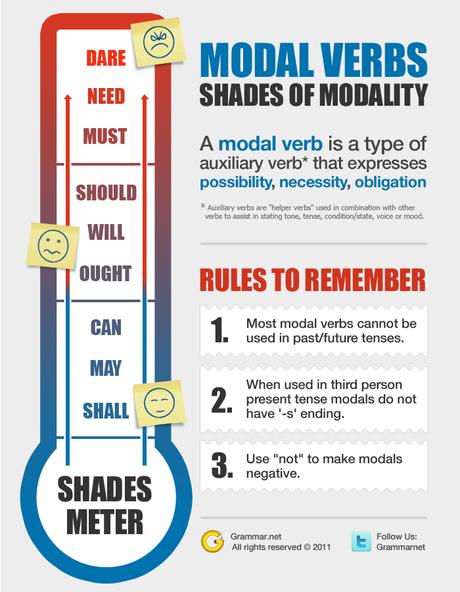
Do you think you should study more English? Do you think that you might be improving? I'm sure you are ☺
Credi di dover studiare più inglese? Credi che miglioreresti? Io credo di sì ☺
The words "should" and "might" are called modal verbs. Modal verbs are very common in English when we want to express possibility, ability and obligation, amongst other things.
Le parole "should" e "might" si definiscono "modal verbs" (verbi modali). I verbi modali sono molto comuni in inglese quando si vuole esprimere possibiltà, capacità e obbligo, tra altre cose.
Here is a list of some of thQui di seguito ti propongo una lista dei verbi modali più comuni e ciò che significano ed esprimono. Non si tratta di una lista completa!e most common modal verbs and the main thing or things they express. This is not an exhaustive list.
Qui di seguito ti propongo una lista dei verbi modali più comuni e ciò che significano ed esprimono. Non si tratta di una lista completa!
should - advice or suggestions
could - possibility
would - a desire or a wish
might - probability
ought to - advice or suggestions. "ought to" is more formal than "should".
can - ability
must - strong obligation or advice
Look at the following text containing some of the above modal verbs:
Leggi il seguente testo che include alcuni dei verbi modali della lista qui sopra:
Matthew is a doctor. He works at Brighton General Hospital. Matthew must wake up at 6 o'clock every morning in order to get to work on time. He lives 45 miles from the hospital but he doesn't have a car so he takes the train and then a bus. All his friends think he ought to buy a car, but he tells them he can't afford it. Matthew believes people shouldn't buy a car unless it's absolutely necessary and that they should use public transport, because cars pollute the air and cause many diseases.
Matthew è un medico. Lavora al Brighton General Hospital. Ogni mattina Matthew deve alzarsi alle 6 per poter arrivare al lavoro in orario. Vive a 45 miglia dall'ospedale ma non ha una macchina, per cui prende prima il treno e poi l'autobus. Tutti i suoi amici pensano che dovrebbe comprarsi una macchina, ma lui dice loro che non se la può permettere. Matthew crede che le persone non dovrebbero comprarsi una macchina a meno che non sia assolutamente necessario e che tutti quanti dovrebbero usare i mezzi di trasporto pubblici dato che le macchine inquinano l'aria e sono causa di molti problemi.
Here are a few useful things to remember about modal verbs:
Ecco alcuni punti da tenere in mente sui verbi modali:
* We can't put two modal verbs together. Here's an example:
Non possiamo usare due verbi modali insieme. Ad esempio:
He might can come to the party.
He might be able to come to the party.
È possibile che (lui) riesca a venire alla festa.
* You can't conjugate modal verbs. For example:
I verbi modali non si possono coniugare. Ad esempio:
He musts buy milk later.
He must buy milk later.
Più tardi deve comprare il latte.
* After a modal verb we use the base form of the verb, i.e. the infinitive without "to", for example:
Dopo un verbo modale dobbiamo usare un verbo all'infinito senza il "to", ad esempio:

